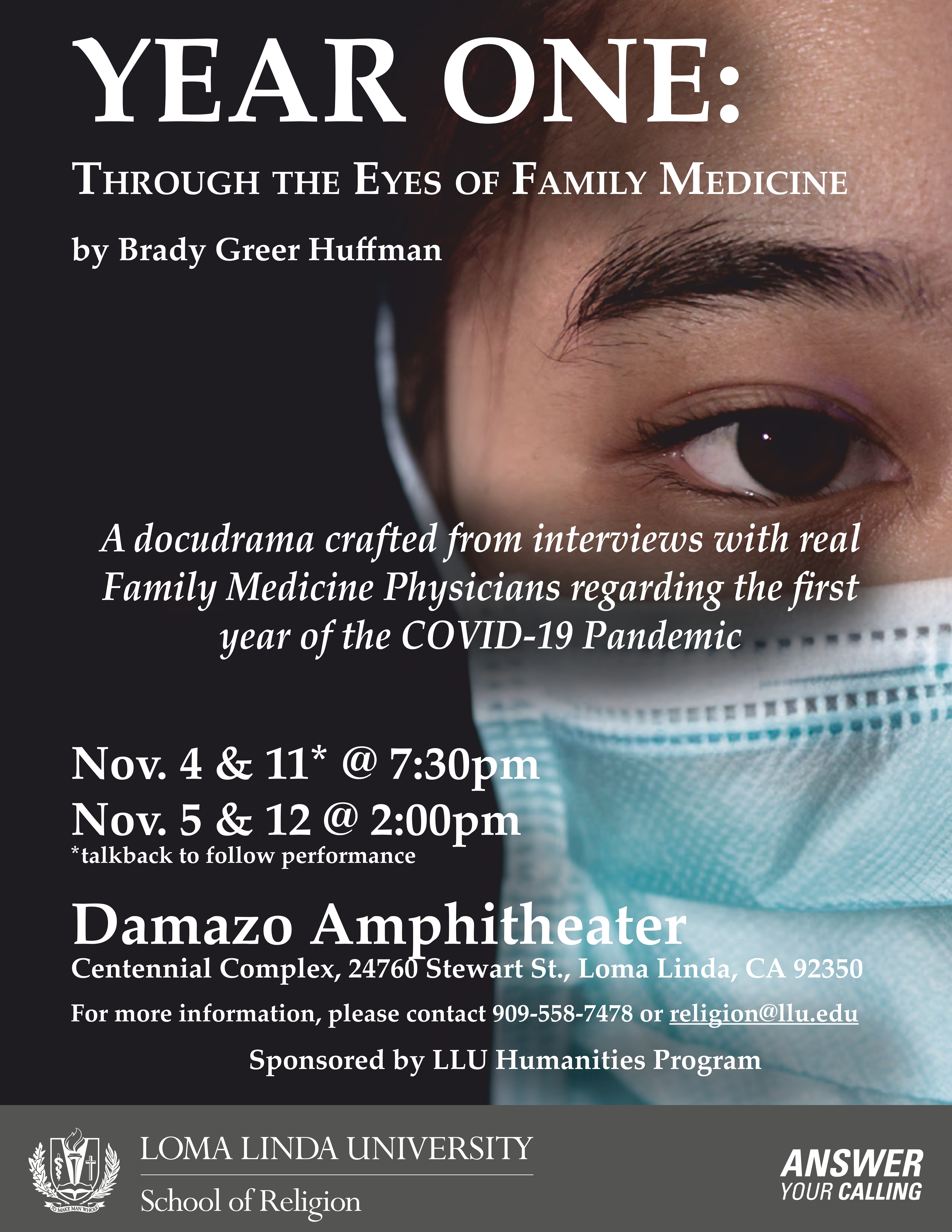
The Loma Linda University School of Religion Humanities Program hosted the presentation of the compelling docudrama "Year One: Through the Eyes of Family Medicine," written by Brady Greer Huffman. The four showings of this poignant production during the first two weekends of November recounted the experiences of Family Medicine physicians navigating the unprecedented challenges faced during the first year of the COVID-19 pandemic. Having a runtime of 90 minutes without intermission, this play sought to amplify the voices of medical providers who served on the frontline of this historic event.
The play commenced with actors portraying family medicine physicians and residents, emphasizing their profound connection with patients' stories and how these narratives are interwoven with patient care. This initial scene set the tone for the entire drama, harnessing the potency of storytelling to navigate complex human experiences such as the pandemic.
Huffman’s inspiration to create this play stemmed from personally witnessing the public perception of physicians shift from heroes to adversaries during the pandemic and how that affected his friends in the field. He remarked, “Physicians are not villains. They’re humans trying to protect the health and safety of our community and their families.” This realization, combined with his academic pursuit in screenwriting and playwriting at UCR-Low Residency Creative Writing Program, motivated him to capture this moment in history specifically through the eyes of physicians.
Conducting interviews with medical providers from February to March 2021, Huffman found these discussions flowed organically. Many of the physicians were eager to share their stories, including their experiences with patients, families, and the onslaught of external pressures during the pandemic. After a year, the first draft was completed and was originally structured as a series of monologues quoting interviewees verbatim. However, through an additional six months of revisions, Huffman meticulously re-crafted the script. While still quoting the words from the interviewees directly, he skillfully intertwined them, presenting 11 separate interviews as a cohesive and continuous dialogue in the completed script.
This play was deeply compelling and profoundly cathartic, evoking various emotional responses from the audience, comprised of physicians, professors, students, and administrators from LLU. Laughter echoed in response to humor, and poignant moments elicited deep contemplation, each person seemingly reliving aspects of their own pandemic experiences.
Following the November 11th performance, a panel discussion ensued, featuring Dr. Zdravko Pantak from the School of Religion as the moderator, along with Dr. Dan Rogstad, Associate Dean, Basic Science Education, at School of Medicine, Dr. Michael Matus, Assistant Professor at School of Medicine, Dr. Lauren Simon, Professor at School of Medicine, Otinelus Lancu, the technical director, and Huffman as interviewees. The physicians shared insights into their professional and personal challenges during the pandemic. They spoke about the difficulty of being leaders who had to simultaneously navigate medically uncharted territory and define the protocol for other physicians to abide by. Simon shared that one of the hardest parts of the pandemic was learning to say farewell not just to patients but to a way of life. Matus admitted feeling discomfort during some parts of the play, finding some scenes so real that they brought back memories he had tried to forget. All the interviewees agreed that the play was an accurate description of their lived experience.
In a dynamic display of storytelling, this play skillfully directs viewers through the highs and lows of the pandemic. Huffman did not shy away from addressing difficult emotional, political, and racial topics. Instead, his dedication to honoring the genuine words and experiences of the interviewees infused this production with raw authenticity, offering audiences a profoundly immersive experience. The play concludes by highlighting the eventual hope vaccines brought to the trajectory of the pandemic. The beautifully written "Year One: Through the Eyes of Family Medicine" not only offered a glimpse into physicians' experiences but also served as a testament to the resilience of humanity amidst the most daunting circumstances.
Article by: Ezrica Bennett
